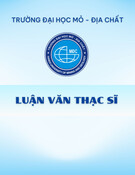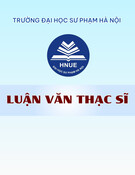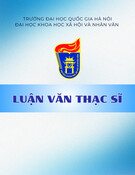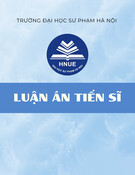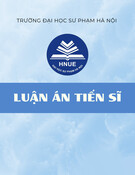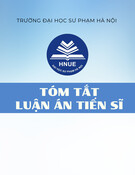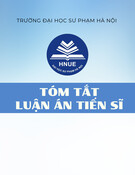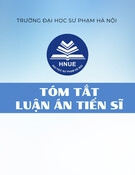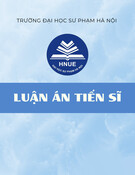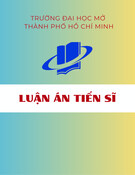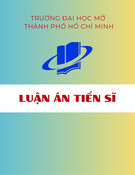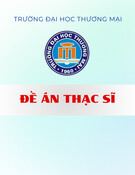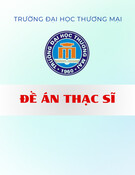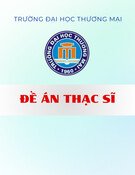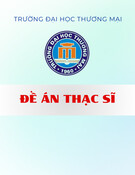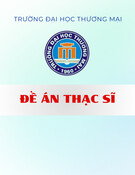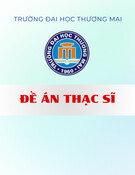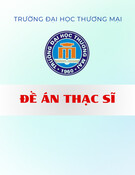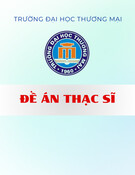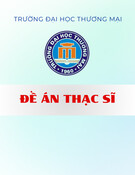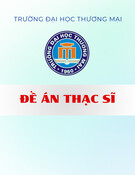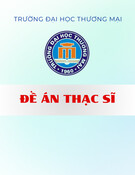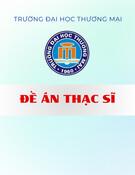VIETNAM NATIONAL UNIVERSITY, HANOI
UNIVERSITY OF LANGUAGES AND INTERNATIONAL STUDIES
FACULTY OF POST-GRADUATE STUDIES
**********************
NHIẾP THỊ VÂN ANH
A STUDY ON VOCABULARY LEARNING STRATEGIES
OF TALENTED STUDENTS IN ENGLISH LANGUAGE
SELECTION AT THANH LIEM C HIGH SCHOOL,
HA NAM PROVINCE
(NGHIÊN CỨU VỀ CHIẾN LƯỢC HỌC TỪ VỰNG CỦA HỌC SINH
ĐỘI TUYỂN HỌC SINH GIỎI MÔN TIẾNG ANH TRƯỜNG THPT C
THANH LIÊM, HÀ NAM)
M.A. MINOR PROGRAMME THESIS
Field: English Teaching Methodology
Code: 60140111
HA NOI - 2016
VIETNAM NATIONAL UNIVERSITY, HANOI
UNIVERSITY OF LANGUAGES AND INTERNATIONAL STUDIES
FACULTY OF POST-GRADUATE STUDIES
NHIẾP THỊ VÂN ANH
A STUDY ON VOCABULARY LEARNING STRATEGIES
OF TALENTED STUDENTS IN ENGLISH LANGUAGE
SELECTION AT THANH LIEM C HIGH SCHOOL,
HA NAM PROVINCE
(NGHIÊN CỨU VỀ CHIẾN LƯỢC HỌC TỪ VỰNG CỦA HỌC SINH
ĐỘI TUYỂN HỌC SINH GIỎI MÔN TIẾNG ANH TRƯỜNG THPT C
THANH LIÊM, HÀ NAM)
M.A. MINOR PROGRAMME THESIS
Field: English Teaching Methodology
Code: 60140111
Supervisor: Dr. Trần Thị Thu Hiền
HA NOI - 2016
DECLARATION
I hereby declare that this dissertation represents my own work and that it
has not been previously submitted to this University or any other institute
in application for admission to a degree, diploma or other qualifications.
Hanoi, 2016
Nhi p Th V n Anh
i
ACKNOWLEDGEMENTS
I would like to express my appreciation, first and foremost, to my
supervisor Dr. Tran Thi Thu Hien, who has patiently and constantly guided
and supported me to develop my study into a practicable frame in the very
beginning and offered valuable suggestions while the work was in progress.
My thanks also go to all the teachers that have instructed me at the National
University for their inspirational lectures in class, by which I have been
motivated to explore some interesting issues concerning English language
teaching and learning .
A special word of thanks goes to my students, without whom it would
never been possible for me to have this thesis accomplished.
Last but not least, I would like to give my immense gratitude to my
family, without whose support my dream of pursuing further study would not
have been possible.
Nhiep Thi Van Anh
ii
ABSTRACT
Although vocabulary forms the biggest part of the meaning of any
language, it is also the biggest problem for most learners.
A study of vocabulary learning strategies was carried out with talented
students in English language selection at Thanh Liem C high school, Ha Nam
province to find the strategies they use most and least popularly. This is only
the initial research (search strategies) to prepare for a long-term study, in
which the useful strategies are applied for other students to improve the
quality of English learning throughout the school.
The research involved 25 talented students in English language
selection at Thanh Liem C high school, Ha Nam province. Data was collected
from a vocabulary learning strategies questionnaire .
Results of the study showed that the students favoured strategies
focusing on guessing meaning from context, when they encountered new
words. Besides, bilingual and monolingual dictionaries is also a useful tool to
help students find the meaning of words. Moreover, many students are
interested in studying words through English language media such as
television programs, Internet, English songs,…
However, students had difficulty implementing a number of social and
metacognitive strategies, such as interacting with native speakers and testing
oneself with word tests.
To conclude, strategy training especially on guessing, dictionary
strategies and deep processing strategies is essential. It would be good if
teachers could provide different opportunities for students to retrieve the
vocabulary learned in different contexts. The results suggested that teachers
should make learners aware of their own responsibility in vocabulary learning
and expose them to different approaches and strategies in enhancing
vocabulary acquisition.
iii
LIST OF ABBREVIATIONS
1
COG Cognitive strategies
2
DET Determination Strategies
3
EFL English as a Foreign Language
4
MEM Memory Strategies
5
MET Metacognitive strategies
6
L1 Native Language
7
L2 Second Language
8
SOC Social Strategies
iv
LIST OF CONTENTS
DECLARATION ............................................................................................ i
ACKNOWLEDGEMENTS............................................................................ ii
ABSTRACT………………………………………………………………….iii
LIST OF ABBREVIATIONS ....................................................................... iv
LIST OF CONTENTS.................................................................................... v
LIST OF TABLES ....................................................................................... vii
CHAPTER ONE : INTRODUCTION ............................................................ 1
1.1 Rationale for choosing the topic ............................................................ 1
1.2 Research question ................................................................................. 3
1.3 Aim and objectives of the study ........................................................... 4
1.4 Scope of the study ................................................................................ 4
1.5. Significance of the study ...................................................................... 4
1.6 Structures of the study ......................................................................... 5
CHAPTER TWO: LITERATURE REVIEW ................................................. 6
2.1. Learning Strategies .............................................................................. 6
2.2 Vocabulary learning strategies............................................................... 8
2.2.1 Definitions of vocabulary learning strategies .................................. 8
2.2.2 Classifications of vocabulary learning strategies ............................ 9
2.3 Previous studies on Vocabulary Learning Strategies .......................... 13
2.4 Summary ............................................................................................ 16
CHAPTER THREE: METHODOLOGY ..................................................... 17
3.1 Research Setting .................................................................................. 17
3.2 Participants .......................................................................................... 17
3.3 Data collection instrument .................................................................. 18
3.4 Method in Language Learning Strategy Research .............................. 20
3.5 Data collection procedure ................................................................... 21
CHAPTER FOUR : FINDINGS AND DISCUSSION ................................. 23
v
4.1 Findings .............................................................................................. 23
4.1.1 Discovery strategies ...................................................................... 23
4.1.2 Consolidation strategies ............................................................... 27
4. 2 Discussion ......................................................................................... 32
CHAPTER FIVE : CONCLUSION.............................................................. 37
5.1 Concluding remarks ............................................................................ 37
5.2 Implications ......................................................................................... 38
5. 3 Limitations ......................................................................................... 39
5.4 Recommendations for further research ............................................... 40
REFERENCES............................................................................................. 41
APPENDIX ..................................................................................................... I
PART 1: The Student‟s Personal Background ................................................ I
PART 2: Vocabulary Learning Strategies Questionnaire .............................. II
vi
LIST OF TABLES
Table 3.1 Information of the participants ..................................................... 18
Table 4.1. Determination Strategies used by the talented students ............... 24
Table 4.2. Social strategies used by the talented students ............................. 25
Table 4.3. Memory strategies used by the talented students ......................... 27
Table 4.4 . Cognitive strategies used by the talented students ...................... 29
Table 4.5. Metacognitive strategies used by the talented students ................ 31
vii
CHAPTER ONE : INTRODUCTION
1.1 Rationale for choosing the topic
Vocabulary is the knowledge of words and word meanings. As Steven
Stahl (2005) puts it, "Vocabulary knowledge is knowledge; the knowledge of
a word not only implies a definition, but also implies how that word fits into
the world." Vocabulary knowledge is not something that can ever be fully
mastered; it is something that expands and deepens over the course of a
lifetime. Instruction in vocabulary involves far more than looking up words in
a dictionary and using the words in a sentence. Vocabulary is acquired
incidentally through indirect exposure to words and intentionally through
explicit instruction in specific words and word-learning strategies.Limited
vocabularies prevent students from comprehending a text. Therefore, an
effective approach to vocabulary is always one of the great concerns of every
language teacher.The reason is that learning vocabulary is really challennging
requiring many cognitive processes, and teachers have to make sure that the
students understand the word and its meaning as well as how to use the word
accurately and appropriately.
At upper- secondary schools in Vietnam, with a short duration of 3
periods per week for all language skills and language focus, vocabulary
instruction has paid less attention than it should have been. Students have to
learn so many new words every week, and by the time they learn the new
words in the new lessons they have forgoten most of the words they have
learned in previous lessons.
Moreover, most of the students, in fact, are not interested in
vocabulary lessons. They feel bored with the common methods used by
teachers since most of the teachers of English at the researcher‟ school are
still applying the traditional ways of teaching. “Teacher talks – students
1
listen”. These traditional approaches encourage students to recite facts and
figures, not stimulate their thinking and their analytical skills. Consequently,
the students are not able to apply what they‟ve learned, not able to make
connections of what they‟ve just learned and what they had learned in the
past.These traditional methods do not promote active engagement and
participants. As a result, students become passive.They don‟t have
opportunity to participate in learning vocabulary ativities.They consider the
teachers‟explanation for meaning, definition, pronunciation, spelling and
grammatical functions boring.This leads to the problem that language learners
have nothing to do in vocabulary learning section but to listen to their
teacher.
It is known that vocabulary is not available knowlegde, it should be a
long-term cumulative study. The teaching and learning of English vocabulary
becomes more difficult for rural students experiencing problems due to
learning conditions, teachers, etc. Besides, with applying the innovation in the
current exams, many students do not focus on learning English because it is
simply for them to avoid the worst score when doing multiple choice English
tests , therefore, they pass the graduation exam easily .
The researcher is now in charge of teaching English for grade 10 and
12. During teaching,the researcher found that vocabulary plays an important
role in the students‟language learning. It is one element that links the four
skills of speaking, listening, reading and writing all together. In order to
communicate well in a foreign language, students should have a number of
words and should know how to use them accurately.
In fact, the students at Thanh Liem C high school have encountered a
lot of difficulties in remembering as well as using vocabulary.The ability to
apply vocabulary learning strategies is still limited, for example, whenever
2
students think of vocabulary, they think of a list of new words with meaning
in their native language without any real context practice. They look up the
words in bilingual dictionary to find their meaning of new words. Working by
this way, after a short period of time, many students may find out that
learning vocabulary doesn‟t satisfy them. Students often learn to deal with the
checking vocabularies of the teacher, then there are no circumstances and
skills to apply those words, so learning new words becomes useless.
Meanwhile, the talented students in the English language selection proved
that they had capability of learning new words when they achieved good
results in the vocabulary tests.
The writer would like to do a survey to know what English learning
strategies talented students in the English language selection are using
popularly and how often they learn these strategies. From the results of this
initial study, a more long-term study will be conducted in the mass student to
find out, compare and apply for student‟s learning in order to improve
learning English of all students at the writer‟ school. So the writer has decided
to examine the question:“A study on vocabulary learning strategies of talented
students in English language selection at Thanh Liem C high school, Ha Nam
province”
1.2 Research question
The primary aim of the present study is to investigate actual vocabulary
learning strategies that talented students in English language selection at
Thanh Liem C high school have used in English learning, therefore, this
research attempts to answer the following research question:
“What vocabulary learning strategies are most and least popularly used
by the talented students in English language selection at Thanh Liem C high
school ?”
3
1.3 Aim and objectives of the study
The aim of the study is to investigate vocabulary learning strategies
talented students in English language selection at Thanh Liem C high school
have used in English learning. To realize this aim, the paper will :
1. Find the information about vocabulary learning strategies that
talented students in English language selection used when they study words.
2. Draw the most and least popular vocabulary learning strategies
used by talented students in English language selection.
1.4 Scope of the study
The study focuses on exploring vocabulary learning strategies used by
25 talented students who were considered “good learners” at Thanh Liem C
high school. They participated in the exam for talented students annually
with age average between 15-17 years during the first semester of 2015.
Schmitt‟s Taxonomy will be applied to analyse these students‟ use of
vocabulary learning strategies.
1.5. Significance of the study
1.The study can reveal the most and least popularly used vocabulary
learning strategies implemented by the talented students in English language
selection. For talented students in English language selection, exposure to a
large amount of new words and learning vocabulary through vocabulary
learning strategies can develop good habits in terms of English learning as
they study English at high school. Thus, if the instruction of vocabulary
learning strategies leads to good results, it can be put to use in wider scale and
teachers could have a better idea about how to help students learn vocabulary
effectively.
2.The teachers can implement the findings of this study to support high
proficient students and encourage weaker students to get better results.
4
Moreover, this study gives recommendations to other teachers of English on
how to teach the students to use vocabulary stratergies effectively to improve
their learning vocabulary in classes.
3. From the results of this study, talented students in English language
selection also need to adjust the vocabulary strategies to achieve higher
academic results. Besides, the writer will continue to conduct other research
to a wider audience, the mass of students to have overview that helps regulate
the teaching and learning of teachers and students in the researcher‟s school .
1.6 Structures of the study
The study is organized as follow:
Chapter 1: Introduction – provides an overview of the study
Chapter 2 : Liturature Review - a view of relevant liturature on this
issue is presented.
Chapter 3: Research Methodology- a description of research methods is
discussed in detail, including a description of selection of the participants,
data collection instruments and data collection procedures.
Chapter 4: Finding and discussions - the results of the study are
presented.
Chapter 5: Conclusion - the researcher provides a summary on main
points raised in the study, the major conclusion drawn from conducting this
study, and a discussion of the study‟s limitations and suggestions for further
research.
5
CHAPTER TWO: LITERATURE REVIEW
This chapter examines the literature and research relevant to language
learning strategies and vocabulary learning strategies.
2.1. Learning Strategies
The term “strategy” is of military origin where it refers to carefully
designed plans for military operations (Oxford, 1990:7). There have been
numerous attempts to define strategies. According to Rubin (1975:43),
strategies are “ the techniques or devices which a learner may use to acquire
knowledge.” When applied to a non military setting like school
learning, the strategy concept has been taken on a new meaning and has
been transformed into learning strategies. Learning strategies have been
defined in various ways in literature and they are connected to several areas
of language learning. Learning strategies are thoughts or behaviour the
learners use to comprehend, learn or retain new information. (O‟Malley and
Chamot 1990:1)
When O'Malley et al. (1985) came to conduct their research, they based
their definition on Rigney‟s (1978) definition of learning strategies as
procedures which facilitate acquisition, retention, retrieval, and performance.
Whereas, Oxford (1990:8) provided another well-known definition of
language learning strategies as “specific actions taken by the learner to make
learning easier, faster, more enjoyable, more self-directed, more effective, and
more transferable to new situations.”
In addition, Takala (1996, as cited in Kristiansen 1998:44) determines
the word “strategy”: “Strategies are taken to be the behaviours that the
learners engage in during learning that are intended to influence cognitive
andaffective processing.” Meanwhile, Ellis (1985:165) points out that native
6
language speakers use the same strategy types as learners of second
language. However, there are differences in the frequency of strategy use
between native speakers and non-native speakers.
The term language learning strategies has many different definitions.
Research into language learning strategies began in the 1960s and the term
language learning strategy has been defined by many researchers. In most of
the research on language learning strategies, the primary concern has been on
"identifying what good language learners report they do to learn a second or
foreign language, or, are observed doing while learning a second or foreign
language." (Rubin and Wenden 1987:19). Wenden and Rubin (1987:19)
define learning strategies as "... any sets of operations, steps, plans, routines
used by the learner to facilitate the obtaining, storage, retrieval, and use of
information."According to Stern (1992:261),"the concept of learning strategy
is dependent on the assumption that learners consciously engage in activities
to achieve certain goals and learning strategies can be regarded as broadly
conceived intentional directions and learning techniques."All language
learners use language learning strategies either consciously or unconsciously
when processing new information and performing tasks in the language
classroom. Since language classroom is like a problem-solving environment
in which language learners are likely to face new input and difficult tasks
given by their instructors, learners' attempts to find the quickest or easiest way
to do what is required, that is, using language learning strategies is
inescapable. Griffiths (2008) explained that language learning strategies are
activities consciously chosen by learners for the purpose of regulating their
own learning. Griffiths also demonstrated and showed a correlation between
language learning strategy use and English proficiency.
7
2.2 Vocabulary learning strategies
2.2.1 Definitions of vocabulary learning strategies
The term “vocabulary learning strategies” refers to “any set of
techniques or learning behaviours, which language learners reported using in
order to discover the meaning of a new word, to retain the knowledge
of newly-learned words, and to expand one‟s knowledge of vocabulary”
(Intaraprasert 2004:53). Learner autonomy can be enhanced by introducing
learner to different vocabulary learning strategies which can be used in
developing the learning process.
O‟Malley and Chamot (1990:7) supposed that training second language
learners to use learning strategies concentrates mainly on learning vocabulary.
They also point out that vocabulary learning strategies are used most
frequently and are probably the most well-known type of language learning
strategies; but other author mentions that, in comparison with other aspects of
language, such as grammar and pronunciation, vocabulary is the area of
language that learners seem most conscious of.
Vocabulary learning strategies are a subcategory of language learning
strategies which in turn are a subcategory of learning strategies in general. If
language learning strategies can be defined as “specific actions taken by the
learner to make learning easier, faster, more enjoyable, more selfdirected,
more effective, and more transferable to new situations.” (Oxford, 1990:8),
and vocabulary learning strategies constitute knowledge about what students
do to find out the meaning of new words, retain them in long-term memory,
recall them when needed in comprehension, and use them in language
production (Catalan 2003, in: Ruutmets, 2005).
According to Schmitt (1997:199), summarising previous research, that
many learners use vocabulary learning strategies and many learners agree that
vocabulary is an essential part of language. Schmitt (1997:200) notes that
8
even though many studies have been made about language learning strategies
and vocabulary learning, only a few of them have discussed vocabulary
learning strategies. Schmitt (1997:200–201) states that the research done on
the field of vocabulary learning strategies typically concentrates only on
individual or small number of strategies. He believed that the research has
shown patterns of strategy use which can be changed over time when the
learner gets older or becomes more proficient in the language he or she is
studying. Therefore some strategies are more popular in certain age groups (
Schmitt 1997:223).
2.2.2 Classifications of vocabulary learning strategies
In classifying learning strategies, researchers have different ways of
classifying language learning strategies (Intaraprasert 2004:10). These
classification systems give crucial contribution to the knowledge of
vocabulary strategies. Below is a summary, brief discussion as well as
consideration of the classification systems of vocabulary learning
strategies which have been identified in different contexts by different
scholars, such as Cohen (1987;1990); Gu and Johnson‟s (1996) and Schmitt‟s
(1997).The writer selected the classification of these scholars because it is
an useful reference source for the researcher to conduct her own research.
2.2.2.1 Cohen’s classification of vocabulary learning strategies
Vocabulary Learning strategies classified by Cohen (1987:43;1990:21-
37) were put together and could be devided into three main categories :
Category 1: Strategies to remember words
It means that learners use rote-repetition by repeating the word and its
meaning until it seems to have stuck; Besides, using mnemonic associations is
necessary through :
9
- linking the word to the sound of a word in the native language
to the sound of a word in another language, or linking the word to the
situation in which it appeared.
- attending to the meaning of a part of the word or noting the
structure of part and visualising the word in isolation or in a written context .
- placing the word in the topic group and creating a mental image of
the word .
- associating some physical sensation to the word or associating the
word to a keyword; and using of mnemonic device in order to create a
cognitive link between an unfamiliar foreign language word .
Category 2: Semantic Strategies involves in
- Thinking of synonyms in order to build a network of interlinking
concepts
- Clustering words by topic group or type of word ; and linking the
word to another sentence.
Category 3: Vocabulary Learning and Practising Strategies
Analyse the word according to its roots, affixes, and inflections as
a way to understand its meaning. Words in two languages such as using a
Dictionary, the Use of Flash Cards, Grouping and Cumulative Vocabulary
Study.
Besides, vocabulary learning strategied proposed by Cohen (1987;
1990) have been found to share some common characteristics, therefore,
they could be put together to create the new three main categories. They
consist of strategies like remembering words, semantic strategies, and
vocabulary learning and practising strategies.
2.2.2.2 Gu and Johnson’s classification of vocabulary learning
strategies
10
Gu and Johnson (1996:51) investigate Chinese advanced learners‟ use
of English vocabulary learning strategies by using the questionnaire. Gu
and Johnson (1996) note L2 vocabulary learning strategies as
metacognitive, cognitive, memory and activation strategies. These scholars
developed a substantial list of English foreign language vocabulary
learning strategies reported employing by advanced Chinese learners. The
study has profiled the beliefs and strategies of adult Chinese learners for
learning EFL vocabulary. A wide variety of English vocabulary learning
strategies are developed and grouped into following categories:
Metacognitive strategies consist of selective awareness and self-initiation
strategies. L2 learners employing selective awareness strategies know which
words are important for them to learn and are essential for adequate
comprehension of a passage. Learners employing self- initiation strategies
use a variety of means to make the meaning of vocabulary items clear.
Cognitive strategies in Gu and Johnson‟s classification involve
guessing strategies, skillful use of dictionaries and note-taking strategies.
When using guessing strategies, learners draw upon their background
knowledge and use linguistic clues like grammatical structures of a
sentence to guess the meaning of new word.
Memory strategies are classified into practicing and encoding
categories. Word lists and repetition are instances of practicing strategies.
Instructing strategies include strategies such as association, imagery,
visual, auditory, semantic, and contextual encoding as well as word-structure
( analyzing a word in terms of prefixes and suffixes).
The activation strategies refer to strategies that the learners
actually use new words in different contexts. For example, learners may set
sentences using the words they have learned.
11
2.2.2.3 Schmitt’s classification of vocabulary learning strategies
Schmitt‟s (1997) taxonomy of vocabulary learning strategies is
organized in two groups: Discovery Strategies and Consolidation
Strategies.
The following is the strategy inventory offered by Schmitt
(1997).These vocabulary learning strategies were devided into two main
categories:
Category 1: Discovery Strategies.
This category consists of Determination Strategies (DET) and Social
Strategies (SOC).
In Determination Strategies, Schmitt‟s (1997) supposed that learners
paid attention to strategies such as analysing part of speech, analysing
affixes and roots, checking for L1 cognate, analysing any available pictures
or gestures, guessing meaning from textual context, and using a dictionary
(bilingual or monolingual).
In Social Strategies , Schmitt‟s (1997) thought that learners used
strategies ,for instance, asking teacher for a synonym, paraphrase, or L1
translation of new word and asking classmate for meaning when they
discover the meaning of new words.
Category 2: Consolidation Strategies .
Consolidation Strategies includes strategies for consolidating a word
once it has been encountered. Schmitt‟s (1997) stressed on four types of
strategies like :
Social Strategies (SOC) use interaction with other people to improve
language learning. Learners may study and practise meaning in a group
or interact with native speaker, or by any combination of these.
12
In Memory Strategies ( MEM ), Schmitt (1997) explains that most
memory strategies involve relating the word to be retained with prior
knowledge. For example, studying new words with pictures of their
meaning, associating the word with its coordination, synonymy, or
antonymy, using a scale for gradable adjectives or even grouping words
together within a story line.
Besides,Cognitive strategies (COG) do not engage learners in mental
processing but is more mechanical. In Cognitive strategies, Schmitt (1997)
refers to Verbal and Written repetition, Word lists, Putting English labels on
physical objects and Keeping a vocabulary notebook.
Metacognitive strategies (MET) are strategies relating to processes
involving monitoring, decision-making, and evaluation of learners‟progress.
Metacognitive strategies help the learner in determining appropriate
vocabulary learning strategies for learning new words. It includes using
English-language media (songs, movies, newscasts, etc.), Testing oneself
with word tests, Skiping or passing new word and Continuing to study word
over time.
2.3 Previous studies on Vocabulary Learning Strategies
Research on general learning strategies showed that many of them are
used for vocabulary learning. O‟Malley and Chamot (1990:7) note that
research on the effect of training L2 learners to use learning strategies is
often restricted to application of vocabulary tasks . Learners are found to use
more learning strategies for vocabulary acquisition than for other language
activities (Takač, 2008). In one of the first large-scale studies, Ahmed (1989)
investigated how good and poor learners (300 EFL learners in Sudan) applied
vocabulary-learning strategies. For the data collection Ahemd used a think-
aloud procedure, observations, questionnaires, and interviews. The results
13
showed that both good and poor learners used the same macro- strategies
(note-taking, memorization, practice, dictionaries or other information
sources), but good learners applied more micro-strategies within each macro-
strategy; for example, they often used words in context or tested themselves
while practicing.
Gu and Johnson (1996) designed a questionnaire based on previous
strategy research (Oxford, 1990). The questionnaire provided one of the most
comprehensive lists of vocabulary strategies: 108 items. It included three
sections: vocabulary learning beliefs, metacognitive strategies, and cognitive
strategies. Gu and Johnson (1996) administered the questionnaire to 850
Beijing University sophomores who had about six years of English learning
experience. The researchers were interested in the ways learners combined
different strategies, and if the choice of strategy combinations correlated with
students‟vocabulary size and general language proficiency. Learners were
classified by their strategy profiles and learning outcomes into five
groups.The findings revealed that the group of students with the highest
English test scores believed that vocabulary should be picked up through
natural exposure (reading, guessing, contextual encoding) and careful study,
but not memorization. They actively looked for opportunities to use English
outside the classroom. The second best group of participants also believed in
natural acquisition, careful study, and use of new words, but in addition they
had positive feelings about the memorization of words. They used almost
every strategy and spent a lot of time and effort on learning English. Gu and
Johnson (1996) believed that they might have succeeded due to their efforts,
but not to particular strategy use. Most of students in the study reported
average use of various strategies, and the group with lowest English test
14
scores strongly believed in the effectiveness of only a very restricted set of
strategies: memorization and visual repetition.
Vocabulary size correlated positively with general English proficiency.
Positive correlations were also found between both variables and such
strategies as contextual guessing, seeking personally significant vocabulary,
using vocabulary that was not studied in class, active use of dictionaries for
learning purposes (not for comprehension only), meaning-oriented note-
taking, paying attention to word formation, and creating semantic associations
and networks. Strategies aimed at vocabulary retention correlated more with
vocabulary size than with language proficiency. Oral repetition and English
proficiency correlated positively, but visual repetition of new words
correlated negatively with both vocabulary size and English proficiency.
Memorization of vocabulary was found to be useful only when it was used in
cluster with many other strategies.
Schmitt‟s (1997) 58-item questionnaire was administered to 600
Japanese EFL learners of different ages: junior-high school, high school,
university students, and adult learners. Schmitt(1997) distinguished between
strategies used for discovery of new words and strategies for consolidating the
knowledge. Discovery strategies included determination strategies used for
independent looking up of the word‟s meaning and social strategies used for
asking teachers or classmates for a meaning. Consolidation strategies included
social, cognitive, metacognitive, and memory strategies. The participants
were asked to indicate what strategies they used most often, and what
strategies they found most helpful.
The results showed that most frequently used strategies included using
a bilingual dictionary, verbal and written repetition, studying the spelling,
guessing from context, and saying the word aloud. The strategies reported as
15
most helpful coincided with the most used ones: bilingual dictionary use,
saying the new word aloud, oral repetition, and written repetition. The results
also showed changes in strategy use as learners matured: The youngest
learners favored repetition, focus on form, L1–L2 word lists and cards. More
mature learners reported more strategies that involved deeper processing:
imaging, associations, and analysis.
Many more studies have investigated individual vocabulary-learning
strategies, but only a few strategies have been researched in depth. The most
extensively studied vocabulary learning strategies are memory-based and
inferencing strategies (Schmitt, 1997).
2.4 Summary
Chapter two has mainly examined some significant aspects of
vocabulary learning, vocabulary learning strategies and available research
works on vocabulary learning strategies. Through the broad literature
review in the field of vocabulary learning strategies, it can be seen that
several researchers have made use of different vocabulary learning
strategy classification systems. Previous research work has been carried out in
a variety of purposes of the investigation, target populations, methods of data
collection, places of research conduction, and different variables or
factors.
16
CHAPTER THREE: METHODOLOGY
This chapter discusses the methodology used in collecting data for this
study. Firstly, illustrations will be described through research setting and
research question. Secondly, details of the subjects are illustrated. Apart from
the data collection procedure, marking on how the questionnaires were
distributed is included.
3.1 Research Setting
The study was conducted at Thanh Liem C high school. There are 25
talented students in the English language selection. The gifted students were
recruited from the selected classes, including students achieved better
academic achievement in the English learning process.They must participate
in the annual contest for gifted students, therefore, studying, consolidating
and applying appropriate learning strategies to achieve good results in the
exam for excellent students is very essential.
Moreover, in the process of learning English, they are considered to
have good thinking capability and have great enthusiasm about learning
English. These students have rich vocabulary and they have used different
vocabulary strategies to achieve their purposes of learning English. As a
result, some of them won high prizes in the annual competition for gifted
students.
3.2 Participants 25 talented students in English language selection at Thanh Liem C high school in Ha Nam are the target subjects of the study. They are both
male and female students aged from fifteen to seventeen and have learnt
English at secondary schools for 5 years. These students have studied in
English seven years which is a requirement course offered by the National
Curiculumn.
17
The majority of the participants started learning English when they
were ten years old. Most students in the selection consider English their
favorite subject. They are all talented students who got good marks in the
entrance examination of the high school. The table below summarizes the
background information of the participants, including the gender, age and
their grades assessed by the teacher.
Table 3.1 Information of the participants
Gender Grade
Total number of participants Age
Female Male 10 11 12
25 22 3 15-17 11 8 6
There were two reasons behind the choice of these talented students.
Firstly, the group included of students chosen in selected classes,
getting good marks, especially, good at mathematics and English, so they are
very intelligent and it is not difficult for them to study English.
Secondly, all the students had received formal English instructions for
5 years at secondary school, some of them won prizes in competitions for
excellent students previous years and they were supposed to have good
knowledge of English words and sentences.
3.3 Data collection instrument
There are varieties of methods that can be employed to collect data
such as questionnaire, interview, observation and so on. Each method has its
own advantages and disadvantages.The researcher chose questionnaire
because it is one of the most popular instruments. It is quite easy to prepare
and it can be used with a large number of subjects. What is more, the
information collected is not very difficult to tabulate and to analyze
18
(Brown,1995). In addition, questionnaires are generally used in collecting
data from respondents about behavioral questions such as what they are
doing or have done in the past (Dörnyei 2003).
The instrument used in this survey was a 40-item questionnaire
based on Schmitt‟s Taxonomy for vocabulary learning strategies since it is
one of the most comprehensive lists of strategies available and it matched
with the researcher‟s purpose of the study.
The questionnaire draws on both Discovery Strategies and
Consolidation Strategies proposed by Schmitt(1997).The questions in the
questionnaire will be analyzed in their vocabulary learning strategy groups
by counting its percentage. It consisted of 40 items classified by five types of
strategies, such as Determination Strategies, Social Strategies, Memmory
strategies, Cognitive and Metacognitive strategies, which were adapted from
the vocabulary learning strategy classification based on Schmitt‟s Taxonomy
(1997).
Discovery Strategies discovering meaning of new words includes 15
item - questionnaires, whose statements from 1 to 6 aim at gathering the
information about Determination Strategies of Discovery meaning of new
words and statements from 7 to 15 belong to Social Strategies. Meanwhile,
25 statements of Consolidation strategies describe how the students
consolidate a new word such as Memmory strategies (12 statements),
Cognitive (8 statements) and Metacognitive strategies (5 statements ).
The 40-item questionnaires were asked about the frequency of the use
of vocabulary learning strategies implemented by English talented students.
The participants were instructed to self-report how often they used the
strategies by ticking ( √ ) in the corresponding columns. ( see Apendix )
19
The following scales were used to indicate the frequency of the usage
of each strategy:
5 = always use it
4 = often use it
3 = sometimes use it
2 = seldom use it
1 = never use it
The researcher collected the data, analyzed and ranked it in order of
popularity of the strategy, for example, the writer also ranked the popularity
of the strategies in the table with “1” for the most popular and the following
numbers with lower percentage of frequency were less popular strategies.
3.4 Method in Language Learning Strategy Research
“Research methods are procedures a researcher follows in attempting
to achieve the goal of a study” (Johnson 1977: 9). Intaraprasert (2000:53)
affirms that the research methods used to investigate language learning
strategies are procedures a researcher follows in trying to achieve
the goals of a study of language learning strategies, i.e. to elicit
information about language learning strategies employed by language
learners when they learn a language. However, Cohen and Scott (1996) point
out, “no single research method succeeds in the field; certain research
methods are well established but imperfect”. Besides, Robson (1993) points
out that there are many methods which a researcher can use to investigate
how learning strategies are employed by students or language learners in
order to cope with language problems, or to enhance their language
learning. Each method has both weak and strong points, but whatever method
a researcher employs, he or she must take the main purpose of the study into
consideration.
20
The researcher used the exploratory research to explore the research
question because she wanted to determine the nature of the problem and have
a better understanding of the fact what vocabulary learning strategies
the talented students in English language selection at Thanh Liem C high
school used most and least popularly. Through the result of the study, she
could gather preliminary information that will help her define problems and have suggestions for the following research.
The study focuses on the survey of the quantitative differences of
comprehensive high school students‟ responses to vocabulary learning
strategies. Since vocabulary learning is a part of language learning, the main
research method for language learning strategies can be adapted to
vocabulary learning strategies as well including mainly written
questionnaire.
3.5 Data collection procedure
The data collection procedures involved the following steps:
1. The first step was a review of literature about language learning
strategies to overview and familiarize. The questionnaire in English language
was used to collect data. It consisted of 40 items classified by five types of
strategies, which were adapted from the vocabulary learning strategy
classification based on Schmitt‟sTaxonomy(1997): Determination, Social
(Discovery), Social (Consolidation), Memory, Cognitive and Metacognitive in
order to make them suitable for the subjects of the study.
2.The questionnaires were approved and improved by the advisor.
There were some parts to be readjusted and rewritten.
3. The questionnaires were given to 25 students within one class period.
4.The 40-item questionnaires were introduced by the researcher. The
students were also told that they had to answer in terms of how
21
well the explanations of each item describe them. The answered
questionnaires were collected right after the respondents finished them.
5. From all of collected students‟ answers, 40 items of the questionnaire
had been distributed and they were returned, and that is 100% of the students‟
responses. All of the items of the questionnaire were analyzed. The
strategies students always and often used with high percentages are
considered the most popular strategies and the ones that students seldom and
never used with high percentages are considered the least popular strategies.
22
CHAPTER FOUR : FINDINGS AND DISCUSSION
The data gathered through the questionnaire were analyzed to
investigate how often each stratergy is used by talented students in English
language selection who are considered high proficient students at Thanh
Liem C high school and which vocabulary learning stratergies are popularly
used the most and least. The former term refers to always and often and the
later ones refer to seldom and never.
4.1 Findings
Discovery strategies include several determination strategies and social
strategies. A learner may discover a new word‟s meaning through guessing
from context, analysing part of speech (e.g. noun, verb or adjective),
analysing any available pictures or gestures, etc. There is a natural sense that
almost all of the strategies applied to discovery activities could be used as
consolidation strategies in the later stage of vocabulary learning (Schmitt
1997).
For clarity, the writer separate strategies into the types of strategy and
analyze them basing on the results of each type.
4.1.1 Discovery strategies
4.1.1.1 Determination strategies ( DET)
In Schmitt‟s (1997) taxonomy, strategies of determination are strongly
linked with the discovery of a new word, notably, its meaning: these are the
strategies learners apply when they are faced with new words.
The answer to the question shows that the highest percentage belongs
to guessing its meaning from the context as 64% of the students always apply
this strategy and 12% of them often use it when discovering the meaning of
new words ; but up to 52% and 56% of them never or seldom analyse
available pictures or gestures or analyse part of speech (e.g. noun, verb or
23
adjective) . Few students chose analyse part of speech and analyse affixes
and roots when finding a meaning of the word because this figure is modest, it
was only 16%. A small number of students used “ analysing availaible
pictures and guestures” and “analyse part of speech (e.g. noun, verb or
adjective)”frequently when discovery new words because of the low
percentage ( 8%) and 12%.
Beside it, 56% students usually use bilingual dictionaries and 32%
monolingual ones, which confirms the above-mentioned findings in reference
to dictionary use. Monolingual and bilingual dictionary seems to be a useful
strategy for them. This tool helps the learners to learn even more
words because every item in a dictionary is explained or illustrated.
Table 4.1. Determination Strategies used by the talented students
Frequency of use Ranking Categories Strategies 5 4 3 2 1
Guessing its meaning 64% 12% 16% 8% 0% 1 DET from the context
Using a bilingual 56% 24% 16% 4% 0% 2 DET dictionary
Using a monolingual 32% 24% 24% 8% 12% 3 DET dictionary
Analysing affixes and 16% 16% 32% 20% 16% 4 DET roots
Analysing any
5 DET available pictures or 8% 12% 28% 28% 24%
gestures
Analysing part of
5 DET speech (e.g. noun, 12% 12% 20% 32% 24%
verb or adjective)
24
4.1.1.2 Social strategies ( SOC)
The following chart represents the views of the students, when asked
about the their vocabulary learning strategies.
Table 4.2. Social strategies used by the talented students
Frequency of use Ranking Categories Strategies 5 4 3 2 1
learning words from the mass
media such as newspaper, 1 SOC 80% 4% 16% 0% 0% magazines, radio, songs, TV
programmes or films
learning words from word 4% SOC 64% 8% 12% 12% 2 lists or glossary
Asking classmate for SOC 40% 16% 24% 8% 12% 3 meaning
Discovering new meaning
SOC through group work 8% 4% 24% 36% 28% 4
activities
Asking teacher for a sentence SOC 20% 12% 32% 20% 16% 5 including new word;
Asking teacher for a L1 SOC 0% 16% 28% 24% 32% 6 translation of new word
SOC Ignoring it 0% 4% 20% 40% 36% 7
SOC speaking with non-native 0% 0% 0% 12% 88% 8
interacting with native SOC 0% 0% 0% 4% 96% 9 speakers
According to the frequency of social strategies for discovery, the
results show that the strategy the students used most frequently was “learning
25
words from the mass media such as newspaper, magazines, radio, songs, TV
programmes or films” (80%) and “learning words from word lists or glossary‟
was put in second place with 64%. Perhaps, most students find that learning
vocabulary through the mass media is easy to understand and fit every time
with their activities, and that is also the easiest way of acquiring new words
for them and both of these proved to be considerably more popular with
students. These strategies are also the most-used by all study participants and
this is probable due to the fact that the previous educational system
favored the teacher-centered methodology of teaching.However, as a
language teacher the researcher believes that this is a characteristic of a good
language learner.
Meanwhile, the strategies fewer students chose were “asking classmate
for meaning” (40%) and “discovering new meaning through group work
activities” (8%). The reasons for relying relatively little on social
strategies might be that students, especially younger ones, do not link
social skills with vocabulary and do not consider it a possible way of
encountering or discovering the meaning of new words. Surprisingly, 56% of
total 25 participants reported that they never or seldom used the strategy "I
ask teacher for a L1 translation of new word". It is obvious that the number
of these students prefer social strategy and they do not heavily rely on the
teacher.
In particular, this section also appeared many choices that many
students did not choose, its figures are 0%, for instance, “interacting with
native speakers” or “speaking with non-native” and students never ignored
new words because the percentage expressed as 0%. Speaking or
corresponding with native or non-native speakers of English seemed to be the
strategies the least used when the aim is to discover new words
26
because up to 96% and 88% of students never use these stratergies. This
demonstrates that the students had few opportunites or never had any chance
to meet or contact with foreigners. In fact, communicating with native
speakers is a fantastic way to practice vocabulary. Noticeably, there have
recently been some voluntary foreign teachers coming to school and this is
wonderful chance for students to practice their English and their vocabulary
in particular. However,12% of students rarely used it and up to 96% and 88%
never did so.
4.1.2 Consolidation strategies
4.1.2.1 Memory strategies ( MEM)
Altogether 12 sub-strategies were mentioned for memorizing new
vocabulary. The analysis here was more detailed: first, the overall results
were calculated and all of the students were ranked, the results were
calculated for each group of students and finally, the number of strategies
students applied were also counted. Considering all the students, the
following list in Table 4.3 shows the strategies for memorizing new
vocabulary from the most popular one to the least popular.
Table 4.3. Memory strategies used by the talented students
Frequency of use Ranking Categories Strategies 5 4 3 2 1
learning the words of an 1 MEM 60% 24% 12% 8% 0% idiom together
making a note of the new
2 MEM word on the handout 56% 16% 16% 8% 4%
(underline, add L1)
grouping words together to 3 MEM 40% 20% 12% 16% 12% study them
4 MEM associating the word with 36% 28% 16% 8% 12%
27
Frequency of use Ranking Categories Strategies 5 4 3 2 1
a similar one in L1
MEM saying the word aloud 20% 28% 12% 20% 20% 5
studying the pronunciation 20% 16% 20% 24% 20% 6 MEM of the word
learning vocabulary in 28% 20% 16% 20% 16% 7 MEM short phrases
Studying word in a 20% 16% 24% 20% 20% 8 MEM dictionary
studying the spelling of 24% 16% 20% 24% 16% 9 MEM the word
putting new words into 10 MEM 12% 16% 20% 20% 24% sentences
putting the new word
11 MEM down with its 12% 16% 24% 20% 28%
pronunciation
writing vocabulary in
context, adding new words 12 MEM 4% 8% 16% 20% 52% with a definition, synonym
or collocation
With regard to “learning the words of an idiom together” and “making
a note of the new word on the handout”, more than half of the students used
these strategies with high frequency(60%) and (56%), so they become the
most popular strategies. Although students seldom and never use “putting
new words into sentences” as a strategy when first discovering a new
word,“ putting new words into sentences” appears to be an important tool
when the aim is to memorize this word. “Grouping words together to study
them or “associating it with a similar one in L1” are also strategies most
28
students use with 56% and 40%. In spite of the fact that quite a lot of
students always and often say the new word aloud (48%), fewer of them
study the pronunciation of a new word, the percentage of students always
and often using this strafegy is low with (28%); whereas, number of students
seldom or never use this strafegy up to 44% and hardly any of them “ put the
new word down with its pronunciation” (12%). This might either be due to a
lack of education in this respect or because students do not consider it vital.
Also, although the majority of the participants always make a note on their
handout (56%) and grouping words together to study them (40%), fewer of
them learn vocabulary in short phrases (28%), “putting new words into
sentences” (12%), writing vocabulary in context or “adding new words with a
definition, synonym or collocation” (4%) ; therefore, the strategies such as
“putting new words into sentences” and “writing vocabulary in context” or
“adding new words with a definition, synonym or collocation” become the
least-used strategies.Apparently, the more active the learner needs to be when
using a strategy, the lower the number of students who use it.
4.1.2.2. Cognitive strategies ( COG)
Table 4.4 . Cognitive strategies used by the talented students
Frequency of use Ranking Categories Strategies 5 4 3 2 1
Keeping a vocabulary 60% 28% 12% 0% 0% 1 COG notebook
Taking note in class 42% 20% 24% 4% 0% 2 COG
Highlighting new words 42% 24% 12% 12% 0% 3 COG
Using the vocabulary 40% 20% 28% 8% 4% 4 COG section in the textbook
Studying words through 40% 16% 24% 12% 8% 5 COG talking to classmates
29
Frequency of use Ranking Categories Strategies 5 4 3 2 1
making an effort to use COG 6 36% 24% 20% 8% 12% in speaking
making an effort to use COG 7 24% 16% 24% 24% 12% in writing
Interacting with natives
8 COG and try to use new 0% 0% 8% 28% 64%
words
Generally, it can be claimed that students use cognitive strategies more
frequently than that of the other ones . 88% of the participants always and
often use the strategy “ keeping a vocabulary notebook to jot down new
words” they want to learn. It seems that these students prefer writing down
the information which they consider useful because all information is
remembered better when it is written as well.
However, as regards using word lists, “using the vocabulary section in
the textbook” and “studying words through talking to classmates” got the
same percent (40%), the reason for which may be that they spend less time
consolidating new vocabulary. Only 36% and 24% of the participants always
use the strategy “making an effort to use in speaking and writing” when they
try to learn the new word by repeating it out loud several times.
Words need to be repeated in order to be studied. Usually, books provide a
context that helps studetns figure out the meaning of words they do not
know. This contextualized learning deepens learners' understanding of words
they are learning, and they learn which words go together.
The least used cognitive strategy is a social one (interacting with native
speakers), which verifies what was mentioned earlier about the avoidance of
these strategies, and almost students do not study new words by making an
30
effort to use them in speaking and writing by the percentage shown just 0%
always and up to 28% seldom and 64% of students never use it.
4.1.2.3 Metacognitive strategies ( MET)
As can be seen from the table 4.5, the Metacognitive strategies
facilitate learning with many English sources and it can interest and motivate
learners. Some example of these strategies are listening to English songs
and news, and memorizing words from English magazines.Study words
through English language media : television programs, Internet, English
songs, etc.
Table 4.5. Metacognitive strategies used by the talented students
Frequency of use Ranking Categories Strategies 5 4 3 2 1
Studying words through
English language media
1 MET : television programs, 56% 16% 24% 4% 0%
Internet, English
songs,…
Continuing to study 2 MET 48% 8% 24% 16% 4% word over time
practicing time 3 MET 32% 12% 20% 20% 16% scheduled and organized
Testing oneself with 4 MET 24% 12% 24% 16% 24% word tests
Skiping or passing new 5 MET 20% 16% 24% 12% 28% words
First of all, making use of English language media as a metacognitive
strategy seems most popular with these students, perhaps because of the
31
language practice classes, but its significance does not decrease. Mass media
such as television, radio, newspaper, magazines, stories, internet os songs are
not only informative but also effective way to enrich and retain vocabulary.
That is the reason why the students are always encouraged to make use of it.
Another interesting fact is that the more advanced students are, the
more they dare to skip or pass a new word, the less they continue to study
word over time and the less often they test themselves with word
tests. 48% of total 25 participants always use the strategy “Continue to
study word over time”. Continuing to study word over time helps in revising
them by rewriting a word over and over again and practicing pronunciation.
However, it is surprising that the students‟ practice time is not at all
scheduled and organized. Only 48% of informants always or often practice
time scheduled and organized and a small number of students seldom and
never use it (32%). Vocabulary knowledge has been consistently shown to be
more strongly related to reading comprehension than other components of
reading. Even if a reader has and uses good metacognitive strategies in first
language, they will not be of use in the second language until the reader
develops a solid language base.
4. 2 Discussion
The research scrutinizes in detail the vocabulary learning strategies
used by talented students in English language selection at Thanh Liem C high
school. It presents the strategies that students use to learn words in English.
It was demonstrated that learning new words is a complex process and the
students need to use many strategies in order to remember the meaning of the
words.
For Determination strategies, guessing its meaning from the context
and bilingual dictionaries are more popularly used than monolingual
32
dictionary and other strategies. The reason may be that using monolingual
dictionary often takes time. In fact, the students are often encouraged to use
monolingual dictionaries because it will give them chance to practice and
study words repeatedly. Once, the students get familiar with this strategy ,
they will find it very helpful especially for the English majors.
Regarding to Social strategies, the informants reported that more than
half of them seldom or never used these strategies, only few students used
them with frequency and a large number of them never did so. It can be seen
that these strategies were not frequenly used by the students . Learning words
from the mass media such as newspaper, magazines, radio, songs, TV
programmes or films and learning words from word lists or glossary are the
most frequenly used strategies while asking teacher for a L1 translation of
new word, interacting with native speakers and speaking with non-native are
the least frequently. This fact can be easily understood because students may
be afraid to ask their friends or teachers for their help in L1 translation.As far
as I know that our students do want to interact with native speakers although
they don‟t have many chances. That is the objective reason why more than
half of them did not employ the strategy of interacting with native speakers.
Discovering new meaning through group work activities and Asking teacher
for a sentence including new word were not frequenly used by the students.
A possible explaination is that the students have no extra time for this activity.
They finish school and then go home and most of them have the habit of
learning at home by themselves.
In terms of Memory strategies, the students were discovered to
employ the strategy of oral repetition and creating mental images most often
. These strategies are the approaches which relate new materials to existing
knowlegde such as associating the word with a similar one in L1, putting the
33
new word down with its pronunciation and writing vocabulary in context,
adding new words with a definition, synonym or collocation. It was
interesting to note that about a large number of students also employed the
strategy of written repetition of a word whereas many students repeated the
word aloud to aid in memory of the word, too. However students
seemed to have problems in putting new words into sentences (28%) and
writing vocabulary in context, adding new words with a definition, synonym
or collocation (12%).The data could imply that the students encounter
difficulties in making sentences to study and practice the meaning of words as
well as paraphrasing the words‟ meaning, etc.
It can be seen that not many of the students used these strategies,
maybe, for the reason is that they are not familiar with it. However, among
this group of strategies, learning the words of an idiom together and making a
note of the new word on the handout (underline, add L1) were used
frequently. It‟s because learning idioms is not only interesting but also
necessary for their vocabulary tests. The students, especially English majored
students, often deal with this when having tests.
At first glance, it can be observed that cognitive strategies for
conscious learning are much more valued by the participants than
metacognitive ones related to planning and evaluating the language
process. This reveals the fact that immediate goals are more important to
students than general language learning aims, perhaps because they have
not received any training in these metacognitive strategies.
Cognitive strategies such as keeping a vocabulary notebook, taking
note in class and highlighting new words were prefered by the students.
These talented students believed that keeping a vocabulary notebook was
useful to consolidate new words. Meanwhile, the rest strategies making an
34
effort to use in speaking and making an effort to use in writing or Interacting
with natives and try to use new words were used with low frequency. These
are very simple and feasible activities for the students, so that they should be
encouraged to use them as often as a habit.
In a whole, Metacognitive strategies were not frequently used. As it is
said that „testing oneself with word tests‟ and „skipping or passing new
words‟ got small percentages. However, studying words through English
language media: television programs, Internet, English songs,… has become
more popular in here, so that students should make use of this kind of modern
technology for the purpose of learning English in general and for learning
English vocabulary in particular. Somehow, the students have been always
given the best learning conditions from the teachers , the school and the local
government.
When the researcher delivered the questionnaire, she hoped that she
would get the large proportion of the students continuing to study word over
time and practicing words with time scheduled and organized fluently. What a
pity that a small number of them always did this ( 48% or 36 %). Up to 20%
never study word over time and some talented students practice words
without time scheduled and organized .Teachers should know this and think
of ways to encourage, even request their students to employ this strategy.
Luckily, most of the students sometimes or rarely skipped or passed new
words. Up to 24% of them never did so.
Besides, some other students also thought that studying the word over
time could enhance retention. This seems to suggest that the excellent
students regarded the cognitive strategies and metacognitive strategies as
useful tools to consolidate new words and they could be used in a
35
complementary manner, that is, the learners can create their own vocabulary
notebooks and review over time.
To sum up, the result of the study show that only some of the strategies
introduced in the questionnaire are frequently used by the students. Most of
the strategies are infrequently used.
36
CHAPTER FIVE : CONCLUSION
5.1 Concluding remarks
This research is on the preliminary study on the use of vocabulary
learning strategies.Even though this is an original study for a long-term study,
some preliminary conclusions can be drawn that can be taken into
consideration when designing an improved version of the questionnaire.
The study has searched the answer for the research question “What
vocabulary learning strategies are most and least popularly used by
the talented students in English language selection at Thanh Liem C high
school ?”.
The result showed that these talented students paid attention to using
vocabulary learning strategies to get better achievement, which is definitely a
positive finding.
For Discovery strategies, the most popular strategy the students used
was guessing from context. The following popular strategies were learning
words from word lists or glossary and using bilingual dictionaries, studying
words through English language media : television programs, Internet,
English songs,etc as these strategies got high percentages.
The strategies considered the least popular strategies were analysing
available pictures or gestures, analysing part of speech (e.g.noun,verb or
adjective) or interacting with non- native or native speaker got low
percentages, it demonstrated that these strategies are not used frequently.
For consolidation strategies, strategies such as learning the words of an
idiom together, making a note of the new word on the handout (underline, add
L1) and keeping a vocabulary notebook or studying words through English
language media : television programs, Internet, English songs, etc were
supposed the most popular strategies.
37
However, the students of the study tend to avoid some social and
metacognitive strategies , for instance, interacting with native speakers,
analysing part of speech (e.g. noun, verb or adjective),writing vocabulary in
context, adding new words with a definition, synonym or collocation and
testing oneself with word tests when the figures of these strategies were very
low, thus, these strategies were ranked the least popularly.
When we look at the pattern of the strategy use, we could see that good
students tend to learn under their interest. The students seem to enjoy learning
English from real experiences, by listening to English songs, watching
English movies etc, more than inside the classroom. So the students can make
sustainable progress in English with pleasure and without any pressure.
Besides, the strategies such as asking teacher for a first language
translation of new word and putting the new word down with its
pronunciation become less important as students get better knowledge.
The finding suggests that students would need to engage more
strategies to enhance their learning and memory of the vocabulary. Although
the subjects in this study were discovered to have knowledge of certain
strategies, yet they failed to practice what they have learned. It is
important to make students aware that learning does not only
involve having knowledge of a particular strategy, but rather it will
become enhanced when we make use of that knowledge.
5.2 Implications
As for the pedagogical implications, the finding from the survey
indicates that it will be necessary and beneficial for the students if various
vocabulary learning strategies are employed.
More vocabulary learning strategies should be introduced to students
and can be used as methods of vocabulary learning. For instance, teachers
38
continue to encourage use of a dictionary and other learning media. Teachers
can also assign more interesting vocabulary tasks in order to engage and
inspire students to do vocabulary tasks.
From the results of this study, the group teachers of English has agreed
to apply the vocabulary learning strategies on training gifted students and the
writer will conduct an action research to find out vocabulary learning
strategies of mass students.
Since the language learning strategies are considered as other good
tools for language learners, it is expected that this study will be able
to support the English teachers‟ pedagogical viewpoints and give valuable
information on how the students process information and select the most
suitable vocabulary learning strategies to enhance their language learning.
Besides, teachers should help these talented students become better
language learners by training them in using the right strategies or appropriate
strategies that suit their level so that they can get good marks in the exam of
excellent students. Both objectives and goals can be achieved when students
are well trained in strategies used.
Strategies “writing vocabulary in context, adding new words with a
definition, synonym or collocation” should be used more in class so as to
help them get used to making sentences, writing essays as the talented
students in English language selection have more chances to get better score
when they have good writing skill.
5. 3 Limitations
This is an exploratory study of students‟vocabulary learning
strategies.The questionaires is a singgle instrument of data collection.The data
from the questionnaire were self-reported by the participants.Therefore,there
are some limitations.
39
First, the data were collected by using only one instrument-
questionnaire which do not reflect a reality because students could have not
read the questions carefully but only put a tick when choosing them.
Second, the research was conducted with 25 excellent students at
Thanh Liem C high school, its population was small and this is a preliminary
study, so the contents and the methods are limited.
Third, this research was only studied in a small scale, it is only focused
on vocabulary learning strategies without other skills, such as reading,
speaking. writing, etc.
5.4 Recommendations for further research
The results can be deliberately applied to support students‟ English
learning especially at Thanh Liem C high school.
The method of collecting data should include open-ended questions
into the questionnaires to give students more space to report their valuable
information that might help the researcher understand their strategies of
vocabulary learning.
Other studies of the skills such as reading, speaking, listening, etc…
will be conducted so that the teachers of English at the researcher‟school have
an overall view of teaching and learning English of students.
In the future, the researcher is going to work on vocabulary learning
strategies of mass students to find out the differences, from which she and
her colleagues adjust teaching methods to be suitable for students.
40
REFERENCES
1. Ahmed, M.O. (1988): Vocabulary learning strategies: A case study of
Sudanese learners of English.Unpublished doctoral
dissertation.University College of North Wales, Bangor, UK.
2. Cohen, A.D. (1998). Strategies in learning and using a second language.
New York, NY: Longman.
3. Brown, T. S., and Perry, F. L. Jr. (1991). A comparison of three learning
strategies for ESL vocabulary acquisition. TESOL Quarterly.
4. Carrell, P. L.(1989). Metacognitive awareness and second language
reading. Modern Language Journal.
5. Carter, R., and McCarthy, M. (1988). Vocabulary and language teaching.
London: Longman.
6. Chamot, A. U. (2004). Issues in language learning strategy
research and teaching. Electronic Journal of Foreign Language
Teaching.
7. Cheung, C-Y. (2004). The effectiveness of vocabulary learning
strategies of Chinese low achievers. Master‟s thesis, Hong Kong: The
University of Hong Kong.
8. Cohen, A. D. (1998). Strategies in learning and using a second language.
London: Longman.
9. Dörnyei, Z. (2003). Questionnaires in second language research:
Construction, administration, and processing. Mahwah, New Jersey:
Lawrence Erlbaum.
10. Ellis, R. (1997). Second language acquisition. Oxford: Oxford University
Press.
11. Fan, M. Y. (2003). Frequency of use, perceived usefulness, and actual
usefulness of second language vocabulary strategise: A study of
Hong Kong learners. The Modern Language Journal.
41
12. Gu, Y., and Johnson, R.K. (1996). Vocabulary learning strategies and
language learning outcomes. Language Learning.
13. Gu, Y. (2003). Vocabulary learning in a second language: person, task,
context and strategies. TESL-EJ, 7(2), A-4. Available at: http://www
writing.berkeley.edu/TESL-EJ/ej26/a4.html (10 Dec. 2003).
14. Gu, Y. (2005). Vocabulary learning strategies in the Chinese EFL
context. Marshal Cavendish Academic, Singapore
15. Intaraprasert, C. (2004). EST students and vocabulary learning
strategies: A preliminary investigation. Unpublished research,
Suranaree University of Technology, Nakhon Ratchasima, Thailand.
16. Kudo, Y. (2000). Second language vocabulary learning strategies .
Abstract retrieved February 18, 2008, from
http://www.lll.hawaii.edu/nflrc/NetWorks/NW14/\
17. Kung, W. J., and Chen, S. E. (n.d.). An exploratory on vocabulary
learning strategies by Taiwanese EFL elementary school students.
Available:
http://english.nccu.tw/new/wenshan2005/session6/%E9%BE%94abstract.doc
18. Lau, W.H. (2002). Instruction on vocabulary learning strategies: A
stepping stone to independent learning? Unpublished master‟s thesis, The
University of Hong Kong, Hong Kong.
19. Law, B.Y. (2003). Vocabulary learning strategies: A case study of Form
Four students in a Chinese-medium secondary school. Unpublished
master‟s thesis, The University of Hong Kong, Hong Kong.
20. Lo, O.K. (2007). An investigation into the perceptions and effectiveness of
various vocabulary learning strategies of Hong Kong ESL learners with
low English proficiency. Unpublished master‟s thesis, The Universi ty of
Hong Kong, Hong Kong.
21. Nation, I.S.P. (1990). Teaching and learning vocabulary. New York:
Newbury House.
42
22. O‟Mally, J. M., & Chamot, A. (1990). Learning strategies in second
language acquisition (The Cambridge Applied Linguistics Series).
Cambridge: Cambridge University Press.
23. Schmitt, N. (1997). Vocabulary learning strategies. In N.
Schmitt & M. McCarthy (Eds.), Vocabulary: Description,
Acquisition and Pedagogy . Cambridge: Cambridge University Press.
24. Takač, V. P. (2008). Vocabulary learning strategies and second language
acquisition. Clevedon, UK: Multilingual Matters.
43
APPENDIX
----------------------------------------------------------------------------------------------
PART 1: The Student’s Personal Background
Please provide the information about yourself by circling the choices
given or write the response where necessary:
1. Age: 15 16 17 more than 17
2. Gender (circle the answer): Male Female
3. You are studying in Grade : 10 11 12
4. Year of study at your school:
5. Number of years studying English:
6. Do you think English is : (You can choose more than one)
easy difficult
interesting useful
boring useless
others (please specify) ………………………………….….
7. Your English ability is: poor/weak moderate good/very good
8. Number of years taking part in English language selection: 1 2 3
I
PART 2: Vocabulary Learning Strategies Questionnaire
A Survey of Vocabulary Learning Strategies
Directions
The Vocabulary Learning Strategy Questionnaire (VLSQ) is designed to
gather information about how you use English vocabulary learning
strategies.This of vocabulary learning strategies is designed for students who
learn English as a foreign language. In the statement below, you will find
statements related to various English vocabulary learning strategies. Please
read each statement carefully then put (√ ) in the box (5,4,3,2 or 1 ) which
most describes your opinion on the strategies you use to learn English
vocabulary.
Degree of frequency of Your Own Vocabulary Learning Strategy Use
“Always” : you always or almost always use the strategy described in
the statement
“Often” : you use the strategy described more than half the time
“Sometimes”: you use the strategy described in the statement half of the
time.
“Seldom” : you use the strategy described in the statement less than half
of the time
“Never” : you never use the strategy described in the statement
II
I. Discovery Strategies
Degree of
frequency Number Categories Strategies
5 4 3 2 1
I guess its meaning from the 1 1 DET context
I analyse part of speech (e.g. 2 2 DET noun, verb or adjective)
DET I analyse affixes and roots 3 3
I analyse any available pictures 4 4 DET or gestures
5 5 DET I use a monolingual dictionary
6 6 DET I use a bilingual dictionary
Ask teacher for a L1 translation 7 1 SOC of new word
I ask teacher for a sentence 8 2 SOC including new word;
9 3 SOC I ask classmate for meaning
I discover new meaning through 10 4 SOC group work activities
11 5 SOC I interact with native speakers
12 6 SOC I speak with non- native
I learn words from word lists or 13 7 SOC glossary
I learn words from the mass
media such as newspaper, 14 8 SOC magazines, radio, songs, TV
programmes or films
15 9 SOC I ignore it
III
II. Consolidation Strategies
Degree of
frequency Number Categories Strategies
5 4 3 2 1
16 1 COG I keep a vocabulary notebook
17 2 COG I take note in class
I use the vocabulary section in 18 3 COG the textbook
I make an effort to use in 19 4 COG writing
I make an effort to use in 20 5 COG speaking
I interact with natives and try to 21 6 COG use new words
22 7 COG I highlight new words
I study words through talking to 23 8 COG classmates
24 1 MEM I studying word in a dictionary
I study the pronunciation of the 25 2 MEM word
I associate the word with a 26 3 MEM similar one in L1
27 4 MEM I put new words in sentences
28 5 MEM I say the word aloud
I learn vocabulary in short 29 6 MEM phrases
IV
Degree of
frequency Number Categories Strategies
5 4 3 2 1
MEM I study the spelling of the word 30 7
I group words together to study 31 8 MEM them
I make a note of the new word 32 9 MEM on the handout
I write vocabulary in context,
adding new words with a 33 10 MEM definition, synonym or
collocation
I put the new word down with 34 11 MEM its pronunciation
I learn the words of an idiom 35 12 MEM together
I study words through English
language media : television 36 1 MET programs, Internet, English
songs,…
I practice time scheduled and 37 2 MET organized
38 3 MET I skip or pass new word
39 4 MET I testing oneself with word tests
I continue to study word over 40 5 MET time
Thank you for your co-operation!

